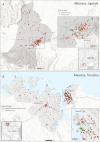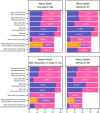Antibiotic dispensing practices during COVID-19 and implications for antimicrobial resistance (AMR): parallel mystery client studies in Uganda and Tanzania
- PMID: 36774512
- PMCID: PMC9919751
- DOI: 10.1186/s13756-022-01199-4
Antibiotic dispensing practices during COVID-19 and implications for antimicrobial resistance (AMR): parallel mystery client studies in Uganda and Tanzania
Abstract
Background: Over-the-counter antibiotic access is common in low-and-middle-income countries and this may accelerate antimicrobial resistance. Our study explores critical aspects of the drug seller-client interaction and antibiotic dispensing patterns for simulated COVID-19 symptoms during the pandemic in two study sites in Tanzania and Uganda, countries with different government responses to the pandemic.
Methods: Research assistants posing as clients approached different types of drug sellers such as pharmacies (Pharms), drug shops (DSs), and accredited drug dispensing outlets (ADDOs) in Mwanza, Tanzania (nPharms = 415, nADDOs = 116) and Mbarara, Uganda (nPharms = 440, nDSs = 67), from June 10 to July 30, 2021. The mystery clients held no prescription and sought advice for simulated COVID-19 symptoms from the drug sellers. They documented the quality of their interaction with sellers and the type of drugs dispensed.
Results: Adherence to COVID-19 preventive measures and vigilance to COVID-19 symptoms was low in both sites but significantly higher in Uganda than in Tanzania. A higher percentage of drug sellers in Mbarara (Pharms = 36%, DSs = 35%, P-value = 0.947) compared to Mwanza (Pharms = 9%, ADDOs = 4%, P-value = 0.112) identified the client's symptoms as possibly COVID-19. More than three-quarters of drug sellers that sold prescription-only medicines in both Mbarara (Pharms = 86%, DSs = 89%) and Mwanza (Pharms = 93%, ADDOs = 97%) did not ask the MCs for a prescription. A relatively high percentage of drug sellers that sold prescription-only medicines in Mwanza (Pharms = 51%, ADDOs = 67%) compared to Mbarara (Pharms = 31%, DSs = 42%) sold a partial course without any hesitation. Of those who sold antibiotics, a higher proportion of drug sellers in Mbarara (Pharms = 73%, DSs = 78%, P-value = 0.580) compared to Mwanza (Pharms = 40% ADDOs = 46%, P-value = 0.537) sold antibiotics relevant for treating secondary bacterial infections in COVID-19 patients.
Conclusion: Our study highlights low vigilance towards COVID-19 symptoms, widespread propensity to dispense prescription-only antibiotics without a prescription, and to dispense partial doses of antibiotics. This implies that drug dispensing related to COVID-19 may further drive AMR. Our study also highlights the need for more efforts to improve antibiotic stewardship among drug sellers in response to COVID-19 and to prepare them for future health emergencies.
Keywords: Antimicrobial resistance; COVID-19; Drug sale; Mystery client; Pharmacy; Tanzania; Uganda.
© 2023. The Author(s).
Conflict of interest statement
The authors and MCs declare that they have no competing interests.
Figures




Similar articles
-
Non-prescribed antibiotic dispensing practices for symptoms of urinary tract infection in community pharmacies and accredited drug dispensing outlets in Tanzania: a simulated clients approach.BMC Prim Care. 2022 Nov 19;23(1):287. doi: 10.1186/s12875-022-01905-6. BMC Prim Care. 2022. PMID: 36402956 Free PMC article.
-
Dispensing Antibiotics without Prescription at Community Pharmacies and Accredited Drug Dispensing Outlets in Tanzania: A Cross-Sectional Study.Antibiotics (Basel). 2021 Aug 23;10(8):1025. doi: 10.3390/antibiotics10081025. Antibiotics (Basel). 2021. PMID: 34439074 Free PMC article.
-
Understanding the Role of Accredited Drug Dispensing Outlets in Tanzania's Health System.PLoS One. 2016 Nov 8;11(11):e0164332. doi: 10.1371/journal.pone.0164332. eCollection 2016. PLoS One. 2016. PMID: 27824876 Free PMC article.
-
Non-prescription dispensing of antibiotic agents among community drug retail outlets in Sub-Saharan African countries: a systematic review and meta-analysis.Antimicrob Resist Infect Control. 2021 Jan 14;10(1):13. doi: 10.1186/s13756-020-00880-w. Antimicrob Resist Infect Control. 2021. PMID: 33446266 Free PMC article.
-
Current rates of purchasing of antibiotics without a prescription across sub-Saharan Africa; rationale and potential programmes to reduce inappropriate dispensing and resistance.Expert Rev Anti Infect Ther. 2023 Jul-Dec;21(10):1025-1055. doi: 10.1080/14787210.2023.2259106. Epub 2023 Oct 27. Expert Rev Anti Infect Ther. 2023. PMID: 37740561 Review.
Cited by
-
Patterns of antibiotic resistance in urinary tract infections before and during the COVID-19 pandemic in Uganda and Tanzania.JAC Antimicrob Resist. 2025 Mar 14;7(2):dlaf038. doi: 10.1093/jacamr/dlaf038. eCollection 2025 Apr. JAC Antimicrob Resist. 2025. PMID: 40093370 Free PMC article.
-
Intersecting social and environmental determinants of multidrug-resistant urinary tract infections in East Africa beyond antibiotic use.Nat Commun. 2024 Oct 31;15(1):9418. doi: 10.1038/s41467-024-53253-x. Nat Commun. 2024. PMID: 39482320 Free PMC article.
-
Etiology and antimicrobial susceptibility patterns of bacteria causing pneumonia among adult patients with signs and symptoms of lower respiratory tract infections during the COVID-19 pandemic in Mwanza, Tanzania: a cross-sectional study.Pneumonia (Nathan). 2024 Sep 5;16(1):16. doi: 10.1186/s41479-024-00137-9. Pneumonia (Nathan). 2024. PMID: 39232828 Free PMC article.
-
Antibiotic prescribing practices in community and clinical settings during the COVID-19 pandemic in Nairobi, Kenya.PLOS Glob Public Health. 2024 Apr 25;4(4):e0003046. doi: 10.1371/journal.pgph.0003046. eCollection 2024. PLOS Glob Public Health. 2024. PMID: 38662675 Free PMC article.
-
Unravelling patient pathways in the context of antibacterial resistance in East Africa.BMC Infect Dis. 2023 Jun 19;23(1):414. doi: 10.1186/s12879-023-08392-9. BMC Infect Dis. 2023. PMID: 37337134 Free PMC article.
References
Publication types
MeSH terms
Substances
Grants and funding
LinkOut - more resources
Full Text Sources
Medical

